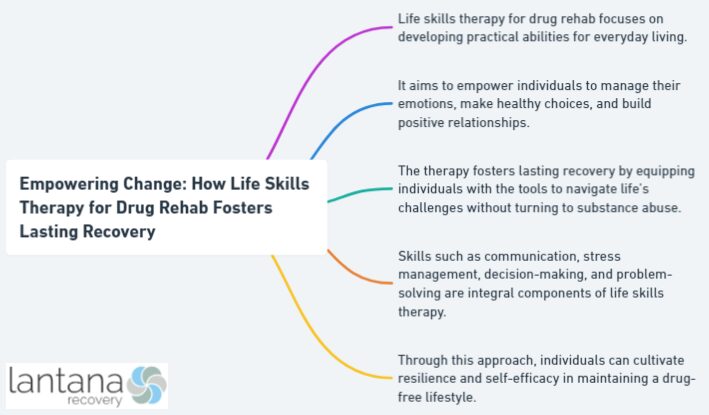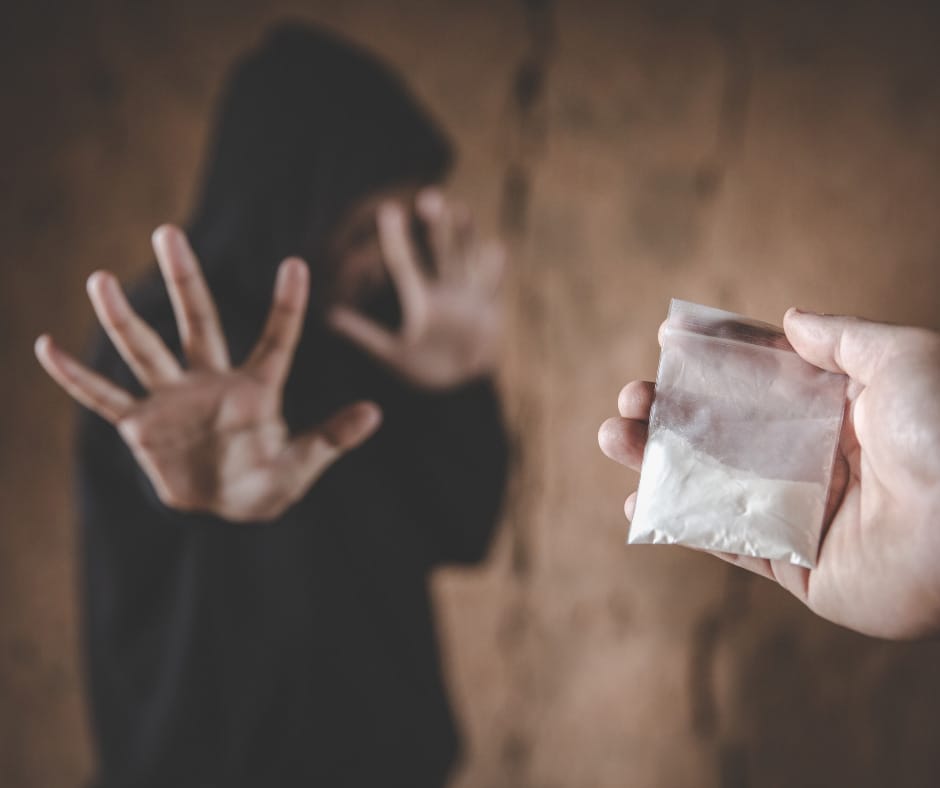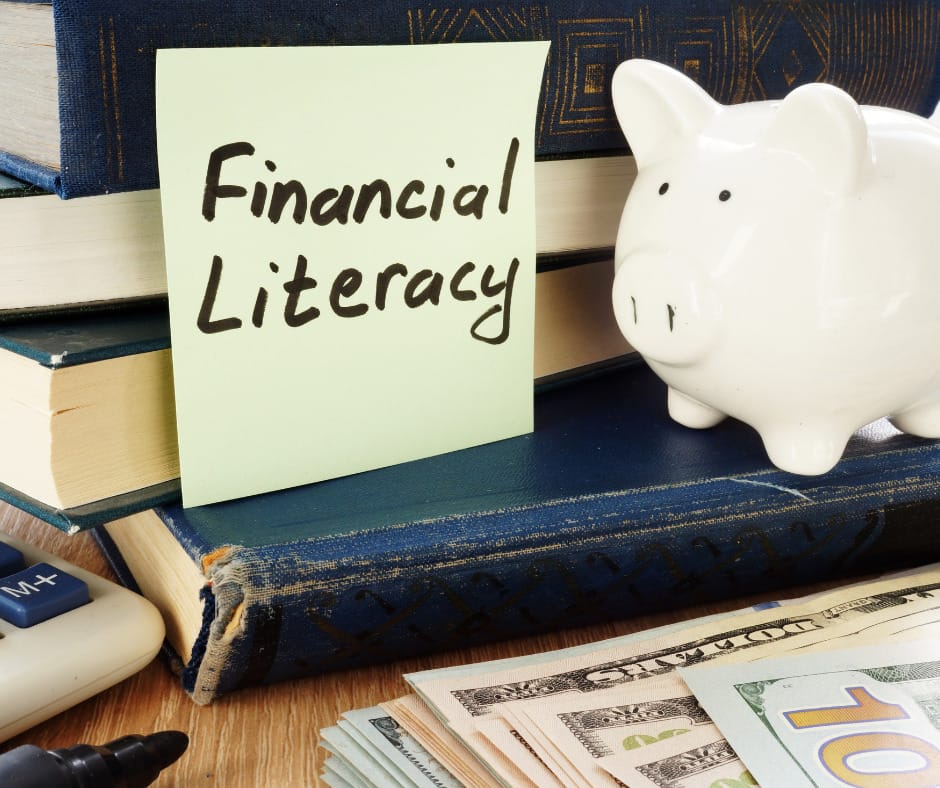Overcoming addiction is a monumental task, and sustaining recovery requires more than just abstinence from drugs or alcohol. Empowering change in an individual’s life involves the development of essential life skills that foster lasting recovery. Let’s explore how life skills therapy for drug rehab can transform lives and provide individuals with the tools they need for successful, long-term sobriety.
Key Takeaways
- Life skills therapy in drug rehabilitation is a holistic approach that focuses on providing essential skills for independent living, social reintegration, and relapse prevention.
- This includes interpersonal skill training to build relationships and communication abilities, stress management techniques, financial responsibility & literacy. Tailored assessments & treatment needs screenings.
- Self-care practices such as personal hygiene, exercise, nutrition are also incorporated into daily routines to support successful recovery journeys and long term sobriety.
Exploring Life Skills Therapy in Drug Rehabilitation
Life skills therapy in drug rehabilitation adopts a holistic approach that surpasses traditional addiction treatment. The therapy focuses on imparting skills for independent living, social reintegration, and relapse prevention. This method of addressing addiction’s root causes and equipping individuals with drug abuse resistance skills promotes preventive behaviors and reduces overall drug abuse.
Integrating life skills training into addiction treatment programs significantly influences an individual’s ability to navigate everyday life challenges. With skills like interpersonal communication, stress management, and financial responsibility, individuals can better handle pressures that may have led to their initial substance use. This comprehensive approach addresses both the physical and psychological aspects of addiction, providing a solid foundation for long-term recovery.
The Core Components of Life Skills Training
Three core components lie at the heart of life skills training, essential for a successful recovery journey: interpersonal skills for social reintegration, stress management techniques, and financial responsibility and management. These important life skills provide a well-rounded approach to recovery, addressing various aspects of an individual’s personal life skills that may have been negatively impacted by addiction. It’s crucial to recognize the important life skills needed for a successful transition into a healthier lifestyle.

Interpersonal Skills for Social Reintegration
Interpersonal skills training forms a crucial element of life skills therapy. It aids individuals in recovery to form healthy relationships, communicate effectively, and navigate social scenarios without succumbing to substance use. By learning and practicing key interpersonal skills, such as active listening, empathy, and conflict resolution, individuals can foster drug abuse resistance skills and create a supportive network of sober friends and family members.
Life skills therapy incorporates life skill training and interpersonal skills training through various activities and exercises, focusing on communication, teamwork, and relationship-building. By enhancing social and emotional competencies, individuals in recovery can successfully reintegrate into society and maintain lasting connections with others.
Stress Management Techniques
Stress, an inevitable part of life, must be effectively managed for maintaining sobriety. Life skills training in drug rehabilitation programs like Lantana Recovery includes managing stress through a range of stress management techniques that help individuals in recovery develop healthy coping mechanisms for dealing with stressors. Techniques such as deep breathing, meditation, and mindfulness can provide a sense of calm and control during challenging situations.
In addition to relaxation strategies, life skills therapy promotes the development of problem-solving and critical thinking skills, allowing individuals to effectively address stressors and make well-informed decisions. By equipping individuals with the tools necessary to manage stress, life skills training can significantly reduce the risk of relapse and support long-term recovery.
Financial Responsibility and Management
Financial stability plays a key role in successful recovery, given that financial stress can trigger substance abuse. Life skills training addresses this aspect of recovery by teaching individuals how to manage their finances responsibly and effectively. Techniques such as budgeting, saving, and debt management can help individuals gain control over their financial situation, thereby decreasing risk factors leading to relapse.
Acquiring financial responsibility and management skills not only promotes stability and independence in recovery but also contributes to an individual’s overall sense of self-esteem and personal accomplishment. By mastering these important life skills, individuals can create a foundation for lasting sobriety and a fulfilling, substance-free life.
Tailoring Life Skills to Individual Needs
Every individual’s recovery journey is unique, and life skills therapy can be customized to address specific areas of weakness and build on existing strengths. By identifying each person’s needs and adapting life skills training accordingly, the therapy becomes more relevant and effective, increasing the likelihood of long-term recovery.
Standardized assessments, psychosocial evaluations, and treatment needs screenings are used to determine the specific life skills that each individual requires. By tailoring the life skills therapy to individual needs, the recovery process becomes more personalized and focused, allowing individuals to develop the specific skills and strategies that are most beneficial to their unique situation.
Enhancing Mental Health Through Life Skills

Life skills therapy addresses not only the physical aspects of addiction but also significantly improves mental health. By fostering self-awareness, addressing negative emotions, and promoting healthy coping mechanisms, life skills training can lead to increased confidence and overall well-being.
Specific life skills, such as effective communication, problem-solving, and emotional regulation, can have a profound impact on an individual’s mental health. By developing these skills and incorporating healthy habits into their daily routine, individuals in recovery can effectively manage stress and maintain a positive outlook, contributing to long-term sobriety and improved mental health.
Strategies for Drug Abuse Resistance

Life skills training equips individuals with the tools necessary to resist the allure of drugs and alcohol. Strategies for drug abuse resistance, such as assertiveness, problem-solving, and decision-making, empower individuals to make healthier choices and avoid relapse. By teaching life skills, this training further enhances their ability to cope with challenges and maintain a drug-free lifestyle.
Assertiveness training, in particular, has been shown to be highly effective in drug abuse resistance. By learning to confidently express their needs, set boundaries, and resist peer pressure, individuals can develop the skills necessary to maintain sobriety and avoid falling back into substance use. Research has demonstrated that assertiveness skill training as a preventive program can reduce the propensity towards addiction and enhance drug abuse preventive behaviors.
Recovery and Relapse Prevention: Vital Life Skills
Skills for recovery and relapse prevention are indispensable for maintaining long-term sobriety. These skills include developing routines, managing emotions, trauma therapy for drug rehab, and avoiding risky situations that may trigger substance use. By incorporating these life skills into their daily lives, individuals in recovery can build a strong foundation for lasting sobriety.
For example, creating a healthy routine can help individuals establish a sense of stability and control in their lives, reducing the likelihood of relapse. Additionally, learning to manage emotions effectively can prevent individuals from turning to substances as a means of coping with stress and negative emotions. By mastering these vital life skills, individuals can successfully navigate the challenges of recovery and decrease risk factors leading to a fulfilling, substance-free life.
Integrating Life Skills with Support Groups
Integrating life skills training within support groups can further augment the recovery process. Support groups provide a safe and nurturing environment for individuals to share their experiences, learn from others, and build lasting connections with their peers. By integrating life skills training with support groups, individuals can develop essential social skills, communication abilities, and camaraderie among their fellow group members.
Peer support groups have been found to augment long-term recovery from substance use disorders. By combining life skills training with the support and encouragement of a group setting, individuals can strengthen their recovery journey and increase their chances of maintaining long-term sobriety.
Life Skills Beyond the Treatment Center
The life skills acquired during drug rehab have applications that extend well beyond the treatment center. These essential skills can be applied in various aspects of daily life, such as managing work responsibilities, maintaining healthy relationships, and pursuing personal goals. By mastering these skills, individuals can navigate the challenges of everyday life with confidence and maintain a fulfilling, substance-free existence.
Furthermore, the ongoing practice of life skills can reinforce the principles of recovery and sobriety, helping individuals to stay focused on their long-term goals and prevent relapse. As individuals continue to apply these skills in their daily lives, they can build a strong foundation for lasting recovery and personal growth.
Building Blocks of Self-Care in Recovery
Self-care practices are vital in the recovery process, fostering physical and mental wellbeing. Essential self-care practices, such as personal hygiene, exercise, and proper nutrition, provide the building blocks for a healthy and successful recovery journey.
By incorporating self-care practices into their daily routine, individuals in recovery can develop a sense of personal responsibility and self-awareness, which are vital for maintaining long-term sobriety. These healthy habits contribute to overall wellbeing and provide individuals with the foundation they need to face the challenges of recovery and life beyond the treatment center.
Financial Literacy and Independence

For individuals in recovery, financial literacy and independence are vital life skills. By learning to manage their finances responsibly and effectively, individuals can achieve stability and autonomy in their lives, contributing to their overall recovery and wellbeing. Developing financial literacy skills, such as budgeting, saving, and debt management, can provide a sense of accomplishment and empowerment in both recovery and life.
Drug rehabilitation centers can integrate financial education into their programs by offering workshops, providing resources, and connecting individuals with government-funded programs. By fostering financial literacy and independence, individuals in recovery can build a strong foundation for lasting sobriety and a fulfilling, substance-free life.
For more information on this, read our article about executive therapy for drug rehab, a recent treatment approach that helps individuals take back control of their professional and financial situation.
Summary
In conclusion, life skills therapy for drug rehab is a transformative and empowering approach to addiction treatment. By addressing the root causes of addiction and equipping individuals with essential life skills, this holistic approach can foster lasting recovery and personal growth. From developing interpersonal skills and managing stress to achieving financial literacy and independence, life skills training provides individuals with the tools they need to navigate the challenges of everyday life and maintain a fulfilling, substance-free existence. Embrace the power of life skills therapy and embark on a journey towards a healthier, happier, and more resilient you.
Frequently Asked Questions
What are life skills for people in recovery?
Life skills can be an important part of recovery, such as effective communication, active listening, and being able to express emotions productively. Keeping up with chores is also a key factor for successful rehabilitation.
What skills and values are necessary to prevent drug and substance abuse?
In order to prevent drug and substance abuse, one must possess the necessary skills such as assertiveness, self-awareness, self-esteem, communication, and decision-making.
What are three organizations that assist people who are affected by alcoholism?
Alcoholism Support Groups, Alcoholics Anonymous (AA), Al-Anon and Alateen, SMART RecoveryTM, Secular Organizations for Sobriety (SOS), Centerstone.org, Women For Sobriety, Your Primary Care Physician, and the American Academy of Addiction Psychiatry (AAAP) are all organizations that assist people affected by alcoholism.
What are the 5 goals of addiction treatment?
Addiction treatment goals focus on physical well-being, mental and emotional health, interpersonal relationships, vocational aspirations, and personal growth.
What are the core components of life skills training?
Life skills training core components include interpersonal skills, stress management techniques, and financial responsibility. These are essential for achieving successful social reintegration.



